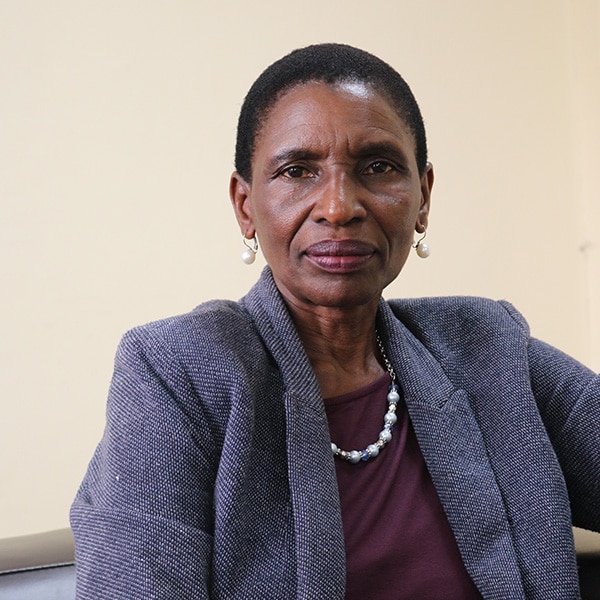Anne Nangulu, a Professor of Economic History and the Principal of Bomet University College (Constituent College of Moi University) serves as the focal person for CARTA at Moi. She is passionate about improving higher education and research not just in Kenya but across the African continent. As a researcher, she is interested in a diverse field of subjects, working on a multidisciplinary approach: economic and urban history, food security and coping mechanisms, the state, constitution and constitutionalism, quality assurance and internationalization of higher education and gender studies.
In this interview, she elaborates on her engagement with CARTA and what it has meant for her personally and professionally.
You have been engaged with CARTA for a considerable amount of time. How has that journey been?
I have been walking with the CARTA program since its conceptualization, around 2006 and eventual take off in 2008. I am part of the team that contributed to the inception of the program and even coined the term ‘CARTA’. When the program started, the focus was on population and public health, but we came to realize that humanities, social science and a multidisciplinary approach are important in so far as bringing a human face to what we were doing.
We therefore deliberated and agreed that as long as an applicant is working on an area that relates to public health and population, then they are eligible for the program. With this, we have found that over the years, beneficiaries have come from virtually all disciplines – Science, Technology, Engineering and Mathematics (STEM); Humanities – Literature, Communications, History, Psychology, Geography and Sociology; Environmental Studies; and Public and Medical Health.
Has CARTA influenced your personal and professional life in any way?
I have been privileged and humbled to have a career in education and more so serve in university management. When I began engaging with CARTA, I was the Dean – School of Arts and Social Sciences at Moi University. Over the years, I have risen into other ranks, such as Coordinator and a Director of Quality at Moi, and Deputy Vice Chancellor in charge of academic research and extension in acting capacity for a period of over six months. Additionally, I have also been appointed by the Government of Kenya as the Deputy Commission Secretary, in charge of quality audit and standards at the Commission for University Education (CUE), Kenya.
One area that I have come to particularly appreciate in my journey with CARTA, is the value of research. Research as a source of funding for university education is very critical. Personally, I have participated in grant writing trainings of CARTA, as a beneficiary/participant and later on as a facilitator. In the process, my horizon for funding has substantially expanded not just for research funding, but also funds for development components: research, infrastructure, equipment or buildings. CARTA has been a learning and gainful experience both in my academic and leadership journey.
In its third phase, CARTA is supporting partner institutions and beneficiaries to independently run existing CARTA interventions. Do you think this is feasible?
I am currently the Principal of Bomet University College, which is a very young institution. I thank the Government of Kenya for this appointment and the opportunity to serve. While putting structures in place for the young institution, I am definitely contributing to the landscape of higher education in Kenya and beyond. I can say that I have brought CARTA interventions on board, particularly bringing focus and investment to research.
I participate in research projects and I have also set up and lead groups of researchers. I put deliberate efforts to bring on board early career academicians by encouraging them to get into research, mentoring them and supporting them with grant writing. In mentoring, I do not just train and give them the theoretical foundations but I literally divide them into groups and work with them to identify and attract research funds whether it is for the actual research, equipment, or conference facilitation. CARTA has taught me that any research fund, no matter how small, matters.
CARTA has given me very big academic and research development and from all my experience with the program, I have understood the model and approach enough to replicate the same model in a number of ways. One instance is a European Union funded project that I was part of conceptualizing and implementing, called the Academic Mobility for Africa Sustainability (AMAS). When a call came from the European Union for a project that can support higher education cooperation between countries in Africa, straight away I applied the experience garnered from CARTA. I took lead and also enlisted like-minded partners to take off the project. The model of AMAS has been like that of CARTA but with a few differences.
First, while CARTA emphasizes on English speaking, AMAS has casted the net slightly farther to also include non-English speakers. We have French, Arabic and Portuguese speaking partners and beneficiaries from Mozambique, Morocco, Benin, and Ethiopia. Kenya’s Moi University is the lead coordinator of the project while Germany’s Universität Bayreuth is the technical partner. Secondly, while beneficiaries of CARTA have to be from partner institutions, AMAS has two targets of beneficiaries. Target one for AMAS partner universities and target two for non-partner universities.
Overall, out of the AMAS collaboration, we have brought in South-South cooperation and contributed to increased availability of trained and qualified high-level professional manpower in Africa. As a way of promoting visibility to Bomet University College which as I said is a young institution, I have brought it on board to host the AMAS website and also offer Secretariat services to the Project. This provides an opportunity for the institution to participate in research and higher education dynamics with well-established partners. At the end of the day, I am proud that I have been able to cascade and replicate the CARTA model successfully.
Looking back at CARTA since inception, any highlights that you believe have contributed to its success?
At the conceptualization of CARTA, the program focused on doctoral training because at that time, PhDs, which are related to expansion of university education and research, were low. The focus then was to have a critical mass and initially the target was just a hundred fellows/graduates. Now we have close to 120 graduates and over 200 fellows, and that is a big achievement. Through CARTA, we also wanted to showcase African universities; that you do not need to leave Africa to get quality education; that African scholars can get trained on the continent and benefit from the initiatives and partners on board. This is great in so far as preventing brain drain and creating quality human resources for academia and research which benefits the African Continent.
While the idea of CARTA began in 2006, it took about two years to bring the initiative into fruition. This time allowed for the refinement of the steps, objectives and approach as well as for us driving the process to really understand what we wanted and needed to achieve. Since the founding in 2008, we have had a call for fellows every year. This is only possible because there are a lot of initiatives for fundraising to support the program. Initially, CARTA was supported by Wellcome Trust but over the years, we have brought on board MacArthur Foundation, Ford Foundation, Carnegie, DAAD, Sida among others. Clear is that funders have seen CARTA’s track record hence the support from existing and new stakeholders along the way. From this, I have learnt that if you do successful projects, with demonstrable positive outputs, then you build confidence in funders and partners.
Along the way, the issue of CARTA beneficiaries being limited to mainstream academia has also risen. Successful post-graduate training is not just about the PhD candidate but is a process that involves other actors such as administrative and faculty staff. CARTA has therefore operationalized and brought in faculty and administrator training referred to as Academic, Professional and Administrative Staff (APAS), previously Faculty and Administrative Staff (FAS) workshops. APAS targets among others administrators, registrars, librarians, finance and procurement teams. Interestingly, some of the faculty and administration individuals trained in CARTA have eventually applied for CARTA scholarships leading to career development and/or transition to lecturing, active research and other related ventures. This demonstrates that CARTA has been able to strengthen academia, research and administrative components in Partner Universities, for the benefit of the African Continent.
The program is now on another level of institutionalizing the CARTA interventions and innovations. We now have workshop trainings for supervisors; we have brought institution management on board; and are targeting Vice Chancellors in what we call the Vice Chancellors’ forum. Additionally, CARTA provides small grants and funding to further support fellows and institutions to independently roll out CARTA interventions and innovations, based on the theory of change, to strengthen doctoral training for the benefit of higher education.
Is there anything you would hope CARTA would do differently for better outcomes?
I am extremely proud of how far CARTA has come and for being part of the whole process. When I think about what we could have done better, I would say nothing. We have done our best and what is now left is to amplify the work and ensure the model is institutionalized in partner institutions and by extension in African Universities across the continent. We are looking forward to having CARTA fellows and alumni wherever they will be engaged, locally, regionally or globally, leveraging on this very fantastic model. I am already doing it and I can do it a hundred times if there is opportunity. As we conclude, I want to reiterate my commitment, that as long as I am able, anytime I am called upon to share experiences, practices, and strategies to enhance postgraduate training or any other training in African universities, I will always be willing. Extremely proud to be part of the CARTA story!




